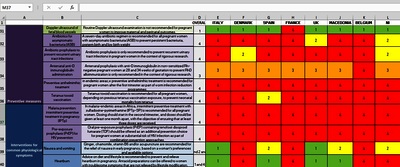Iannuzzi, L., Branchini, L., Clausen, J.A., Ruiz-Berdún, D., Gillen, P., Healy, M., Beeckman, K., Seijmonsbergen-Schermers, A., Escuriet Peiró, R., Morano, S., Di Tommaso, M. and Downe, S., 2018. Optimal outcomes and women's positive pregnancy experience: a comparison between the World Health Organization guideline and recommendations in European national antenatal care guidelines. Minerva Ginecologica, 70 (6), 650 - 662.
Full text available as:
Preview |
PDF
Optimal outcomes and women's positive.pdf - Accepted Version Available under License Creative Commons Attribution Non-commercial. 653kB |
![Optimal outcomes Fig1.jpg [thumbnail of Optimal outcomes Fig1.jpg]](https://eprints.bournemouth.ac.uk/33711/8.hassmallThumbnailVersion/Optimal%20outcomes%20Fig1.jpg)  Preview |
Image (JPEG)
Optimal outcomes Fig1.jpg - Accepted Version Available under License Creative Commons Attribution Non-commercial. 239kB |
|
Copyright to original material in this document is with the original owner(s). Access to this content through BURO is granted on condition that you use it only for research, scholarly or other non-commercial purposes. If you wish to use it for any other purposes, you must contact BU via BURO@bournemouth.ac.uk. Any third party copyright material in this document remains the property of its respective owner(s). BU grants no licence for further use of that third party material. |
DOI: 10.23736/S0026-4784.18.04301-0
Abstract
BACKGROUND: The publication of the World Health Organization (WHO) recommendations on antenatal care in 2016 introduced the perspective of women as a necessary component of clinical guidelines in maternity care. WHO highlights the crucial role played by evidence-based recommendations in promoting and supporting normal birth processes and a positive experience of pregnancy. This paper aims to explore and critically appraise recommendations of national antenatal care guidelines across European countries in comparison with the WHO guideline. METHODS: We collected guidelines from country partners of the EU COST Action IS1405. Components of the documents structure and main recommendations within and between them were compared and contrasted with the WHO guideline on antenatal care with a particular interest in exploring whether and how women's experience was included in the recommendations. RESULTS: Eight out of eleven countries had a single national guideline on antenatal care while three countries did not. National guidelines mostly focused on care of healthy women with a straightforward pregnancy. The level of concordance between the national and the WHO recommendations varied along a continuum from almost total concordance to almost total dissonance. Women's views and experiences were accounted for in some guidelines, but mostly not placed at the same level of importance as clinical items. CONCLUSIONS: Findings outline convergences and divergences with the WHO recommendations. They highlight the need for considering women's views more in the development of evidence-based recommendations and in practice for positive impacts on perinatal health at a global level, and on the experiences of each family.
| Item Type: | Article |
|---|---|
| ISSN: | 0026-4784 |
| Uncontrolled Keywords: | Europe; evidence-based medicine; female; humans; practice guidelines as topic; pregnancy; pregnancy outcome; prenatal care; World Health Organization |
| Group: | Faculty of Health & Social Sciences |
| ID Code: | 33711 |
| Deposited By: | Symplectic RT2 |
| Deposited On: | 12 Mar 2020 13:57 |
| Last Modified: | 14 Mar 2022 14:20 |
Downloads
Downloads per month over past year
| Repository Staff Only - |
 Tools
Tools Tools
Tools